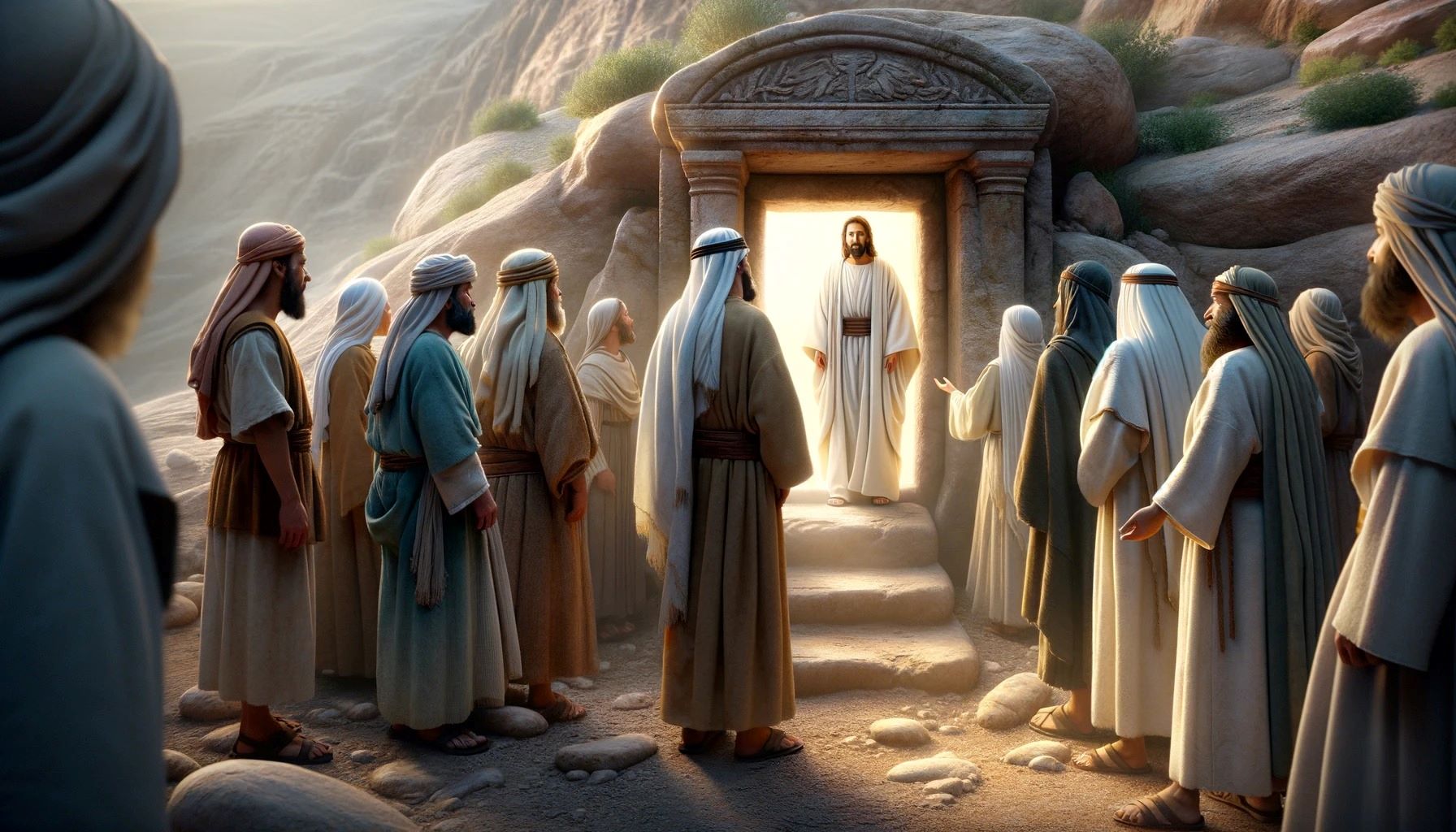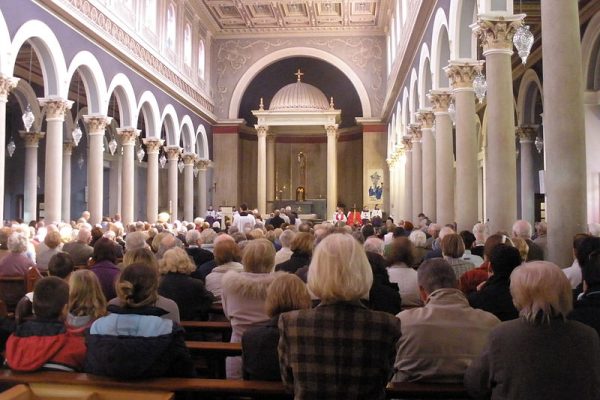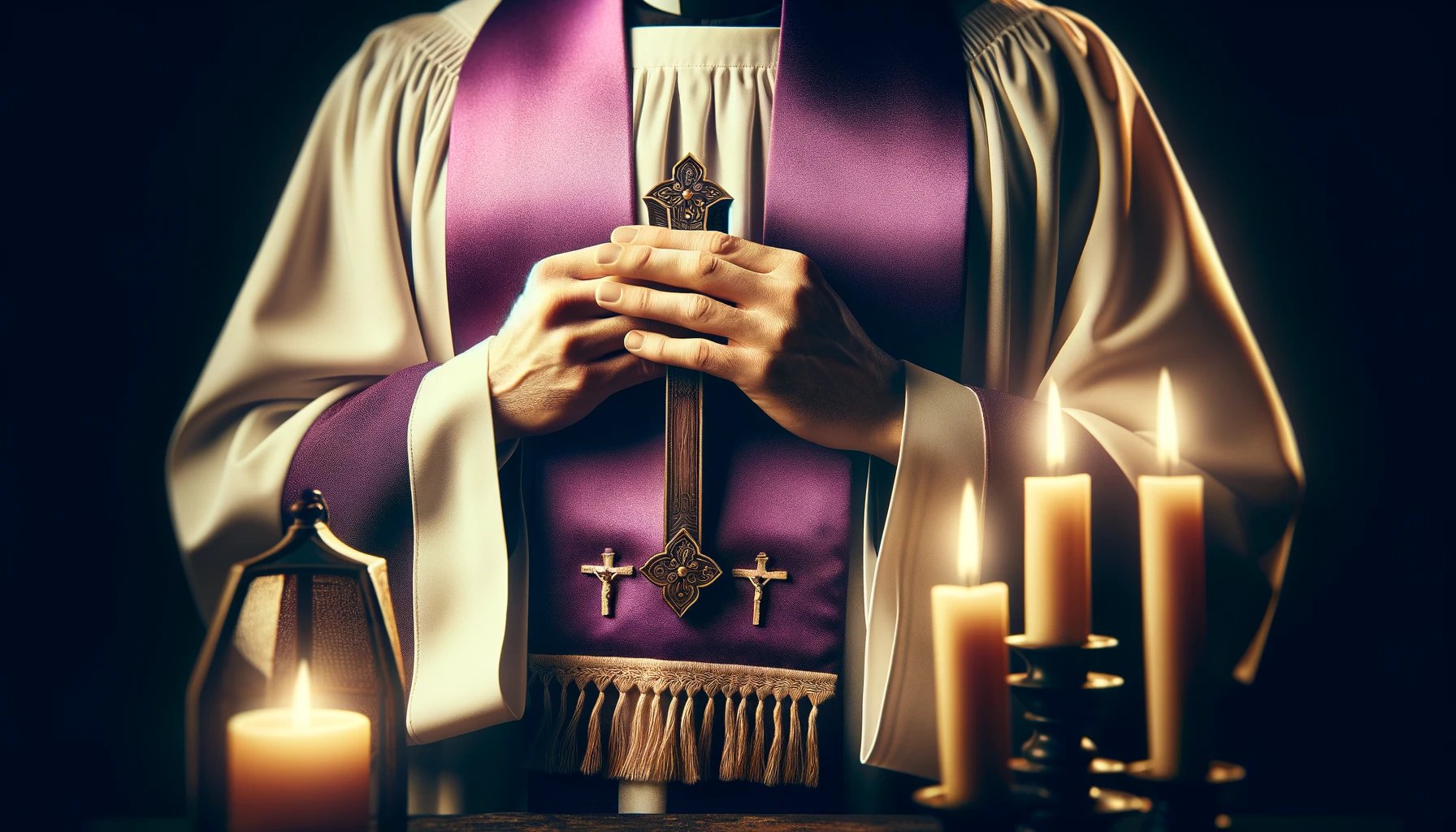Home>Special Themes>What Happens On Sundays During Lent


Special Themes
What Happens On Sundays During Lent
Published: February 29, 2024
Jason DeRose, Managing Editor at Christian.net, uses his expertise in religion and journalism to deepen understanding of faith's societal impacts. His editorial leadership, coupled with a strong academic background, enriches the platform’s diverse content, earning him recognition in both journalism and religious circles.
Discover the significance of special Lenten themes and activities that take place on Sundays during Lent. Explore the traditions and observances of this sacred season.
(Many of the links in this article redirect to a specific reviewed product. Your purchase of these products through affiliate links helps to generate commission for Christian.net, at no extra cost. Learn more)
Table of Contents
The Significance of Lent in the Christian Calendar
Lent holds a significant place in the Christian calendar as it marks the 40-day period of fasting, reflection, and penance leading up to Easter Sunday. This season is a time for Christians to prepare their hearts and minds for the commemoration of the death and resurrection of Jesus Christ. The 40 days of Lent symbolize the 40 days Jesus spent fasting in the wilderness, enduring temptation and preparing for His earthly ministry. It is a period of spiritual discipline, self-examination, and repentance, allowing believers to draw closer to God and grow in their faith.
During Lent, Christians are encouraged to engage in acts of self-denial, such as fasting, prayer, and almsgiving, as a way of identifying with the sufferings of Christ and focusing on spiritual growth. The Lenten season serves as a reminder of the ultimate sacrifice made by Jesus for the redemption of humanity, prompting believers to reflect on their own lives and seek reconciliation with God and others. This period of introspection and spiritual renewal is a vital part of the Christian journey, fostering a deeper understanding of the significance of Christ's death and resurrection.
Lent is also a time for believers to recommit themselves to a life of discipleship, seeking to live in accordance with the teachings of Jesus and the values of the Gospel. It provides an opportunity for individuals to examine their priorities, habits, and attitudes, and to realign them with the principles of love, compassion, and justice exemplified by Christ. The season of Lent thus holds a profound significance in the Christian calendar, serving as a period of preparation, purification, and spiritual growth in anticipation of the joyous celebration of Easter.
Read more: What To Eat For Sunday Dinner During Lent
Traditional Practices on Sundays During Lent
-
Attending Worship Services: On Sundays during Lent, Christians gather for worship, where the focus is on the Lenten journey. The church services often incorporate special readings, prayers, and hymns that reflect the themes of repentance, renewal, and the journey to the cross. The sermons and teachings during this time often center on the significance of Lent and its call to spiritual introspection and transformation.
-
Observing the Sabbath: While Lent is a season of fasting and self-denial, Sundays are considered "mini-Easters" – a time of celebration and joy, commemorating the resurrection of Jesus. As such, the traditional Lenten disciplines of fasting and abstinence are often relaxed on Sundays, allowing for a more festive and celebratory atmosphere. This practice acknowledges the hope and promise of resurrection, providing a brief respite from the rigors of Lenten observance.
-
Engaging in Acts of Mercy: In keeping with the spirit of almsgiving and compassion emphasized during Lent, many Christian communities use Sundays as an opportunity to engage in acts of mercy and service. This may involve volunteering at local charities, reaching out to the marginalized, or participating in community outreach programs. By extending acts of kindness and generosity on Sundays, believers embody the principles of love and selflessness exemplified by Jesus.
-
Fellowship and Communal Meals: Sundays during Lent often provide occasions for communal gatherings and shared meals within the church community. These gatherings foster a sense of fellowship and unity, allowing believers to support and encourage one another in their Lenten journey. The communal meals also serve as a reminder of the fellowship shared by Jesus and his disciples, reinforcing the importance of community and mutual support in the Christian faith.
-
Reflection and Rest: While the Lenten season is a time of spiritual discipline and self-examination, Sundays offer a chance for believers to pause, reflect, and find rest in the midst of the journey. It is a time to reflect on the progress made during the week, to seek spiritual nourishment through prayer and meditation, and to find solace in the hope of Easter. This balance of introspection and rejuvenation on Sundays helps believers navigate the Lenten path with renewed strength and purpose.
Sundays during Lent thus serve as pivotal moments of respite, celebration, and communal worship within the broader context of the Lenten journey. These traditional practices on Sundays provide a balanced approach to honoring the solemnity of Lent while also embracing the hope and joy of the resurrection.
Special Liturgical Observances on Sundays
Sundays during Lent are marked by special liturgical observances that distinguish them from the rest of the week. These observances are designed to emphasize the unique significance of Sundays as days of celebration and reflection within the Lenten season. Some of the special liturgical observances on Sundays during Lent include:
-
The Gloria: In many Christian traditions, the singing or recitation of the Gloria, a hymn of praise and adoration, is reintroduced on Sundays during Lent. This practice symbolizes the joyful anticipation of Easter and the resurrection of Christ. The inclusion of the Gloria on Sundays serves as a reminder of the hope and promise of redemption, lifting the spirits of worshippers and infusing the services with a sense of exultation.
-
The Blessing of the Font: In some churches, the Sundays of Lent witness the blessing of the baptismal font. This ritual underscores the themes of renewal and rebirth, as the church community prepares to celebrate the baptismal promises and the new life found in Christ. The blessing of the font serves as a tangible expression of the spiritual cleansing and transformation associated with the Lenten journey.
-
The Veneration of the Cross: On certain Sundays, particularly Palm Sunday, the veneration of the cross is a prominent liturgical observance. This ritual involves the adoration and reverence of the cross, symbolizing the sacrifice of Jesus and the redemptive power of His crucifixion. The veneration of the cross on Sundays during Lent serves as a poignant reminder of the central focus of the season – the journey to the cross and the ultimate triumph of resurrection.
-
The Liturgical Colors: The use of liturgical colors plays a significant role in the observances of Sundays during Lent. While the season is traditionally associated with the penitential color of purple, the use of rose-colored vestments and paraments on the fourth Sunday of Lent, also known as Laetare Sunday, symbolizes a moment of rejoicing amidst the solemnity. This shift in color reflects the themes of hope and anticipation as the church community approaches the culmination of Lent.
-
The Liturgical Readings: The lectionary readings for Sundays during Lent are carefully selected to reflect the themes of repentance, redemption, and the journey to the cross. These readings often include passages that highlight the ministry and teachings of Jesus, His interactions with His disciples, and the unfolding events leading to His crucifixion. The liturgical readings serve to guide the congregation through the narrative of Christ's earthly ministry, inviting them to contemplate the significance of His sacrifice and the promise of salvation.
These special liturgical observances on Sundays during Lent contribute to the rich tapestry of worship and reflection, underscoring the dual nature of the season as a time of solemn contemplation and joyful anticipation. Each observance serves to deepen the spiritual experience of believers, drawing them into a deeper understanding of the profound mysteries of faith as they journey towards the celebration of Easter.
The Role of Music and Worship During Lenten Sundays
Music and worship play a pivotal role in the observance of Lenten Sundays, enriching the spiritual experience and fostering a deeper connection with the themes of the season. The musical elements incorporated into worship services during Lent serve to evoke a sense of reverence, introspection, and hope, aligning with the overarching tone of the Lenten journey. Here are some key aspects of the role of music and worship during Lenten Sundays:
1. Reflective Hymnody
The selection of hymns and choral music during Lenten Sundays is characterized by a reflective and contemplative quality. These musical pieces often convey themes of repentance, humility, and the journey to the cross, inviting worshippers to engage in introspection and spiritual meditation. The somber yet poignant melodies of hymns such as "O Sacred Head, Now Wounded" and "Were You There When They Crucified My Lord" create a solemn atmosphere, allowing individuals to immerse themselves in the solemnity of the Lenten season.
Read more: What Happens If You Cheat On Lent
2. Choral Settings and Anthems
Choral settings and anthems performed by church choirs during Lenten Sundays contribute to the depth and richness of worship. These musical compositions often draw from the rich tradition of sacred choral music, conveying the profound emotions and theological significance of the Lenten narrative. Through polyphonic textures and expressive harmonies, choral settings such as "Miserere Mei" and "Ave Verum Corpus" provide a musical backdrop that amplifies the spiritual impact of the liturgical readings and prayers, elevating the worship experience.
3. Lenten Liturgical Chants
The use of ancient chants and plainsong in worship services during Lenten Sundays harkens back to the early traditions of Christian liturgical music. Chants such as the Lenten Prose "Attende Domine" and the "Kyrie Eleison" express the penitential character of the season, creating a sense of timelessness and continuity with the historic practices of the Church. The meditative and repetitive nature of these chants fosters a spirit of contemplation and supplication, allowing worshippers to enter into a deeper state of prayerful reflection.
4. Instrumental Offerings
Instrumental music, including organ voluntaries, instrumental solos, and chamber ensembles, enhances the worship experience during Lenten Sundays. The expressive capabilities of musical instruments are employed to evoke a range of emotions, from solemnity to exultation, as they complement the liturgical themes of the season. The resonant tones of the organ, the plaintive strains of the violin, and the reverent sounds of the flute all contribute to the auditory tapestry of worship, creating moments of profound spiritual resonance for congregants.
5. The Paschal Hymnody
As the Lenten season progresses, the musical repertoire gradually transitions towards the anticipation of Easter, culminating in the triumphant hymns of the Resurrection. The gradual introduction of alleluias and joyful hymns such as "Christ the Lord is Risen Today" on Lenten Sundays serves as a musical foreshadowing of the impending celebration of Christ's victory over death. This shift in musical expression reinforces the dual nature of Lent as a season of penitence and preparation, leading to the ultimate joy of Easter.
The role of music and worship during Lenten Sundays thus encompasses a diverse array of musical expressions, each serving to deepen the spiritual engagement of worshippers and enrich the collective experience of the Lenten journey. Through the interplay of music, liturgy, and communal worship, Lenten Sundays become a time of profound spiritual nourishment and transformation for the faithful.
Read more: What Happens During Baptism
How Lenten Sundays Impact Personal Spiritual Practices
Lenten Sundays exert a profound influence on personal spiritual practices, shaping the individual's journey of faith and fostering a deeper connection with God. The impact of Lenten Sundays on personal spiritual practices is multifaceted, encompassing various dimensions of the believer's spiritual life. Here are the ways in which Lenten Sundays leave a lasting imprint on personal spiritual practices:
1. Intensified Prayer and Reflection
Lenten Sundays serve as pivotal moments for intensified prayer and reflection, prompting individuals to set aside dedicated time for communion with God. The solemnity of the Lenten season encourages believers to engage in contemplative prayer, seeking spiritual renewal and discernment. The reflective atmosphere of Lenten Sundays provides an opportunity for individuals to delve into the depths of their spiritual consciousness, fostering a sense of intimacy with the divine and a heightened awareness of God's presence in their lives.
2. Deepened Commitment to Spiritual Disciplines
The observance of Lenten Sundays reinforces the commitment to spiritual disciplines such as fasting, almsgiving, and acts of mercy. As believers navigate the Lenten journey, Sundays serve as anchor points for reaffirming their dedication to these disciplines, infusing their spiritual practices with renewed purpose and resolve. The collective rhythm of the Lenten season, punctuated by the significance of Sundays, encourages individuals to persevere in their spiritual disciplines, cultivating a spirit of self-denial, generosity, and compassion.
3. Enhanced Participation in Corporate Worship
Lenten Sundays inspire heightened participation in corporate worship, drawing individuals into the communal expression of faith. The collective observance of Sundays within the Lenten context fosters a sense of unity and shared purpose among worshippers, reinforcing the communal dimension of the Christian faith. Through active engagement in worship services, believers find encouragement, support, and spiritual nourishment, strengthening their personal spiritual practices through the bonds of fellowship and shared devotion.
Read more: What Happens During A First Communion
4. Cultivation of Gratitude and Hope
The progression of Lenten Sundays cultivates a spirit of gratitude and hope within personal spiritual practices. As individuals journey through the Lenten season, the observance of Sundays becomes a source of gratitude for the promise of resurrection and the redemptive work of Christ. This sense of gratitude infuses personal spiritual practices with a spirit of thankfulness and anticipation, fostering a deep-seated hope that transcends the challenges and trials encountered along the Lenten path.
5. Embrace of Spiritual Transformation
Lenten Sundays catalyze the embrace of spiritual transformation, inviting individuals to undergo a process of inner renewal and growth. The cumulative impact of Sundays within the Lenten framework propels believers towards a deeper commitment to personal holiness, repentance, and spiritual maturation. The themes of redemption and reconciliation embedded in the observance of Lenten Sundays inspire individuals to embrace the transformative work of the Holy Spirit, leading to a profound metamorphosis of heart, mind, and soul.
In essence, the influence of Lenten Sundays on personal spiritual practices is profound and far-reaching, permeating every aspect of the believer's spiritual journey. Through intensified prayer, deepened commitment to spiritual disciplines, enhanced participation in corporate worship, cultivation of gratitude and hope, and the embrace of spiritual transformation, Lenten Sundays leave an indelible mark on the individual's pursuit of spiritual growth and intimacy with God.












